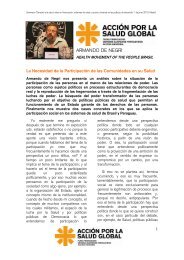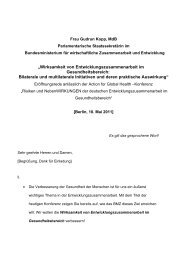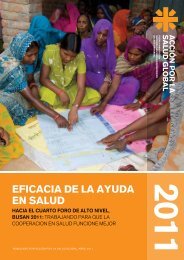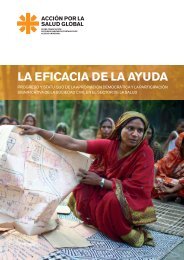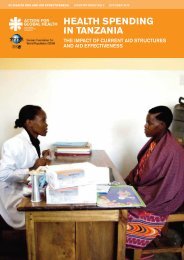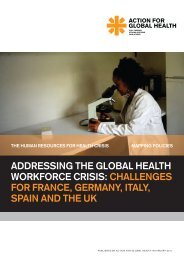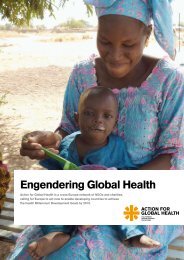Ethiopia Aid effectiveness in the health sector - Action for Global ...
Ethiopia Aid effectiveness in the health sector - Action for Global ...
Ethiopia Aid effectiveness in the health sector - Action for Global ...
You also want an ePaper? Increase the reach of your titles
YUMPU automatically turns print PDFs into web optimized ePapers that Google loves.
<strong>Ethiopia</strong> – <strong>Aid</strong> Effectiveness <strong>in</strong> <strong>the</strong> <strong>health</strong> <strong>sector</strong><br />
organisation and its constituency or beneficiaries is not always clear. These<br />
problems do not help build trust among DPs, <strong>the</strong> Government, and <strong>the</strong><br />
<strong>Ethiopia</strong>n people. This <strong>in</strong>creases scepticism about <strong>the</strong> role of CSOs.<br />
F<strong>in</strong>ally, political factors also h<strong>in</strong>der <strong>the</strong> creation of an enabl<strong>in</strong>g environment <strong>for</strong><br />
CSOs. The Plan <strong>for</strong> Accelerated and Susta<strong>in</strong>ed Development to End Poverty<br />
(PASDEP) <strong>in</strong> <strong>Ethiopia</strong> recognises that: “<strong>the</strong> role of civil society is critical, and a<br />
comprehensive programme of re<strong>for</strong>ms is planned under PASDEP with respect to<br />
<strong>the</strong> role of membership-based CSOs.” In general terms, <strong>the</strong> Government<br />
welcomes CSOs and NGOs work<strong>in</strong>g <strong>in</strong> l<strong>in</strong>e with government policies and<br />
socially sensitive issues such as childcare and HIV/AIDS.<br />
However, it adopts a completely different position when it comes to human<br />
rights and democratisation issues. At <strong>the</strong> end of July 2009, <strong>for</strong> <strong>in</strong>stance, <strong>the</strong><br />
Government suspended 42 NGOs <strong>for</strong> “act<strong>in</strong>g out of <strong>the</strong>ir mandate”. It accused<br />
<strong>the</strong>m of “report<strong>in</strong>g on human rights abuses [as] seek<strong>in</strong>g to <strong>in</strong>terrupt peace and<br />
development of <strong>the</strong> region.” 43 Recent regulations passed by <strong>the</strong> Government<br />
have also limited freedom of <strong>the</strong> press and <strong>the</strong> work of CSOs conduct<strong>in</strong>g rights-<br />
based advocacy. 44<br />
There are almost no domestic sources of fund<strong>in</strong>g available to CSOs and DPs<br />
rema<strong>in</strong> <strong>the</strong> ma<strong>in</strong> recourse. Major funders <strong>in</strong>clude <strong>the</strong> Swedish CSO Cooperation<br />
Programme, <strong>the</strong> EC Civil Society Forum, PEFPAR, <strong>the</strong> Productive Safety Net<br />
Programme (PSNP) and <strong>the</strong> <strong>Global</strong> Fund. None<strong>the</strong>less, among <strong>Ethiopia</strong>n CSOs<br />
<strong>the</strong>re are those who argue that donors are “plac<strong>in</strong>g more emphasis on<br />
government programmes ra<strong>the</strong>r than on CSOs. In some cases, like <strong>in</strong> <strong>the</strong> case<br />
of USAID, <strong>the</strong>y prefer to work with or through American-based INGOs.” 45<br />
Address<strong>in</strong>g <strong>the</strong> social problems faced by CSOs can take some time but<br />
coord<strong>in</strong>ation and organisational factors could be improved <strong>in</strong> a much shorter<br />
time. DPs could actively help <strong>in</strong> this regard by boost<strong>in</strong>g support and capacity-<br />
build<strong>in</strong>g activities among CSOs. None<strong>the</strong>less, <strong>the</strong>se measures require a<br />
favourable political environment <strong>in</strong> order to deliver real progress. Un<strong>for</strong>tunately,<br />
current conditions are not hearten<strong>in</strong>g. Among o<strong>the</strong>r th<strong>in</strong>gs, <strong>the</strong> new law means<br />
that organisations work<strong>in</strong>g on human rights, <strong>for</strong> <strong>in</strong>stance, could see <strong>the</strong>ir sources<br />
of fund<strong>in</strong>g severed.<br />
CSOs regulation<br />
Until very recently, CSOs, NGOs and o<strong>the</strong>r Non-State Actors (NSAs) were<br />
regulated by <strong>the</strong> 1960 Civil Code. This regulation dates from <strong>the</strong> time of Imperial<br />
<strong>Ethiopia</strong> and <strong>the</strong> rule of Haile Selassie. The nature and role of NSAs and CSOs<br />
has been completely trans<strong>for</strong>med <strong>in</strong> <strong>the</strong> last few decades and <strong>the</strong> old code is<br />
clearly <strong>in</strong>adequate to regulate this area. As a consequence, <strong>the</strong>re existed<br />
many gaps when decisions were adopted.<br />
20



